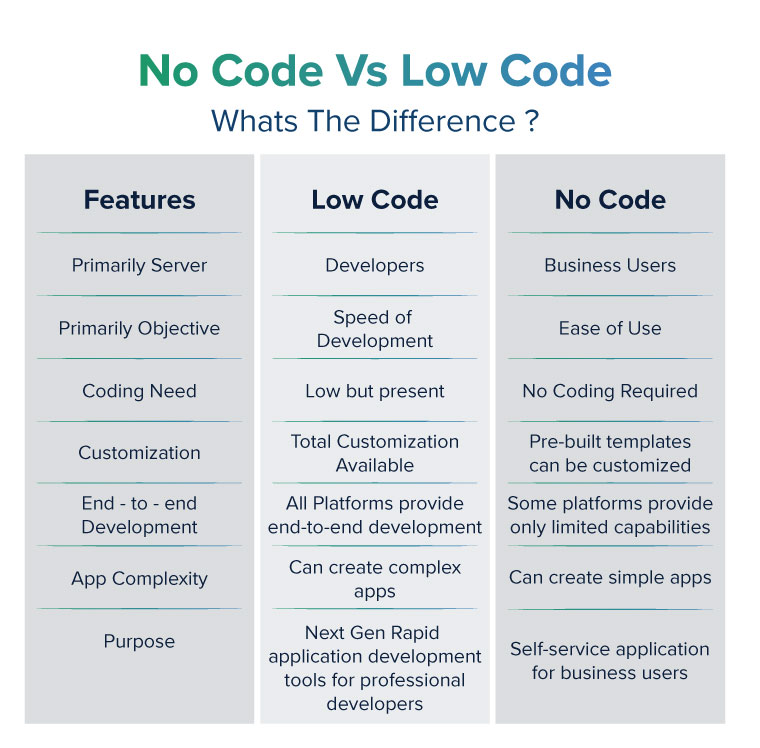Low-code platforms allow users to build software applications using a graphical user interface, rather than writing code manually. These platforms can make it easier for non-technical users to create custom software solutions, and can also enable developers to build applications more quickly by providing pre-built components and modules.
Low-code platforms have the potential to change the way that startups approach software development, as they can enable more rapid prototyping and iteration, and allow startups to build custom solutions without requiring a large team of experienced developers. They may also allow startups to more easily incorporate feedback from users and iterate on their products. This is due to being able to make changes more quickly on a low-code platform.
However, these low-code platforms also have limitations, and may not be suitable for all types of projects. In some cases, custom code may still be necessary to achieve certain functionality or performance requirements. As with any technology, it is important to carefully consider the pros and cons of using a low-code platform before making a decision.
Low-Code Platforms Can Be a Useful Tool for Startups
They can allow non-technical team members to build custom software solutions and can enable faster development of prototypes and MVPs (minimum viable products). This can be particularly useful for startups that need to move quickly and iterate on their products in order to stay competitive.

However, it is important to keep in mind that low-code platforms may not always be the best solution for every project. In some cases, custom code may still be necessary to achieve certain functionality or performance requirements. Additionally, low-code platforms may not provide the same level of control and customisation as custom code, and may not be suitable for more complex projects.
Overall, low-code platforms can be a useful tool for startups looking to build custom software solutions quickly and efficiently, but it is important to carefully consider the pros and cons of using a low-code platform before making a decision.
Low-code platforms can be a useful tool for startups looking to build custom software solutions quickly and efficiently, but it is important to carefully consider the pros and cons of using a low-code platform before making a decision.
Potential Benefits of Using a Low-Code Platform for Startups
- Faster development: Low-code platforms can enable faster development of prototypes and MVPs, as they provide pre-built components and modules that can be easily assembled into custom applications. This can be particularly useful for startups that need to move quickly and iterate on their products in order to stay competitive.
- Increased accessibility: Low-code platforms can make it easier for non-technical team members to build custom software solutions, as they do not require knowledge of programming languages. This can enable startups to build custom solutions without having to hire a large team of experienced developers.
- Enhanced collaboration: Low-code platforms often include features that enable collaboration between team members, such as version control and team management tools. This can make it easier for startups to work together on software projects and incorporate feedback from users.
Challenges Low-Code Can Create Today 
- Technical debt: Are you sure you have access to and the ability to export the data you need? Is anyone else trained on the specific platform this person used? What needs to be fixed in order to change or adapt to the software? Going too fast can have consequences you need to fix.
- Functionality: They are incredibly limited in what they can do, and scaling them to any meaningful degree is costly. Trying to achieve anything complex in them will result in frustration.
- Potential data and security concerns: You can’t filter stupid or inexperienced. Low-code applications can have vulnerabilities.
Conclusion
However, it is important to keep in mind that low-code platforms may not always be the best solution for every project. In some cases, custom code may still be necessary to achieve certain functionality or performance requirements, and low-code platforms may not provide the same level of control and customisation as custom code. It is important to carefully consider the specific needs of your project before deciding whether to use a low-code platform.
Many say that low-code platforms are a perfect match for blockchain technology. To learn more about blockchain, check out our blog post on Blockchain & Proptech Tokenisation, as well as our Blockchain Trends in 2022 post, and Blockchain in Climate Tech.

Amit Khanna, 7startup Founder
Amit has 18 years of experience in the industry and an MBA. He supports entrepreneurs with every aspect of their business including concept and product development, investor presentations, and fundraising. Amit & 7startup assist startups in the pre due-diligence process and help connect them to our vast network of investors. Reach out to us today and see if we’re a fit!





